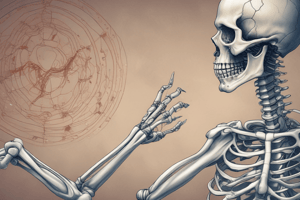Podcast
Questions and Answers
What percentage of the body's total weight does the skeletal system account for?
What percentage of the body's total weight does the skeletal system account for?
- 40%
- 20% (correct)
- 10%
- 30%
How many bones are in the axial skeleton?
How many bones are in the axial skeleton?
- 80 bones (correct)
- 130 bones
- 50 bones
- 100 bones
Which part of the skeleton is responsible for protecting the brain, spinal cord, heart, and lungs?
Which part of the skeleton is responsible for protecting the brain, spinal cord, heart, and lungs?
- Legs
- Appendicular skeleton
- Arms
- Axial skeleton (correct)
How many vertebrae make up the spine or vertebral column?
How many vertebrae make up the spine or vertebral column?
Which bones are included in the appendicular skeleton?
Which bones are included in the appendicular skeleton?
How many total bones are there in the human body according to the text?
How many total bones are there in the human body according to the text?
What is the function of ligaments in the skeletal system?
What is the function of ligaments in the skeletal system?
Which part of the appendicular skeleton is responsible for protecting major organs associated with digestion and reproduction?
Which part of the appendicular skeleton is responsible for protecting major organs associated with digestion and reproduction?
What is the main role of cartilage in the skeletal system?
What is the main role of cartilage in the skeletal system?
Which function does the bone marrow serve in the skeletal system?
Which function does the bone marrow serve in the skeletal system?
What is the primary mineral stored in bones?
What is the primary mineral stored in bones?
What can help in the early detection and treatment of skeletal system issues?
What can help in the early detection and treatment of skeletal system issues?
Flashcards are hidden until you start studying
Study Notes
The Skeletal System
The skeletal system is a crucial part of the human body, providing a rigid framework that supports and protects the organs within. This system is composed of bones, cartilage, ligaments, and tendons and accounts for approximately 20% of the body's total weight. Let's delve into the intricacies of the skeletal system and explore its various components and functions.
Bones
Humans have approximately 206 bones in their body, which is more than the popular children's song suggests. These bones provide the structural support for the body and help protect the internal organs. They are separated into two main categories: the axial skeleton and the appendicular skeleton.
Axial Skeleton
The axial skeleton consists of 80 bones, including the skull, spine, and rib cage. These bones form the central structure of the skeleton and protect the brain, spinal cord, heart, and lungs. The skull is made up of 22 separate bones, but they are often considered as a single entity. The spine, or vertebral column, is composed of 33 separate vertebrae, including the cervical, thoracic, lumbar, sacral, and coccygeal regions. The rib cage, which is made up of the sternum, ribs, and thoracic vertebrae, protects the heart and lungs.
Appendicular Skeleton
The appendicular skeleton contains 126 bones, which include the arms, legs, shoulder girdle, and pelvic girdle. The lower portion of the appendicular skeleton protects the major organs associated with digestion and reproduction, while the upper portion allows for a greater range of motion when lifting and carrying objects.
Cartilage, Ligaments, and Tendons
In addition to bones, the skeletal system also includes cartilage, ligaments, and tendons. Cartilage is a smooth and flexible tissue that covers bones where they meet and acts as a cover that allows bones to move against one another without damage. Ligaments are strong bands of connective tissue that hold bones in place alongside one another, while tendons connect muscles and bones together.
Functions of the Skeletal System
The skeletal system has several key functions:
- Support and Protection: Bones provide a rigid framework that supports and protects the organs within the body. The skull encases the brain, while the ribs protect the heart and lungs, and the vertebrae surround and protect the spinal cord.
- Movement: Bones work together with muscles as simple mechanical lever systems to produce body movement.
- Blood Cells: The bone marrow produces red blood cells, white blood cells, and blood platelets.
- Storage: Bones contain more calcium than any other organ and act as storage for some minerals like calcium and vitamin D.
Health and Common Challenges
The skeletal system is susceptible to various health conditions and injuries, such as arthritis, osteosarcoma, osteoporosis, sprains, tears, and fractures. Regular checkups with a healthcare provider can help in early detection and treatment of any issues affecting the skeletal system.
In conclusion, the skeletal system plays a vital role in the human body, providing structural support, protection, and other essential functions. Understanding the various components and functions of the skeletal system can help us appreciate its importance in maintaining our overall health and well-being.
Studying That Suits You
Use AI to generate personalized quizzes and flashcards to suit your learning preferences.


